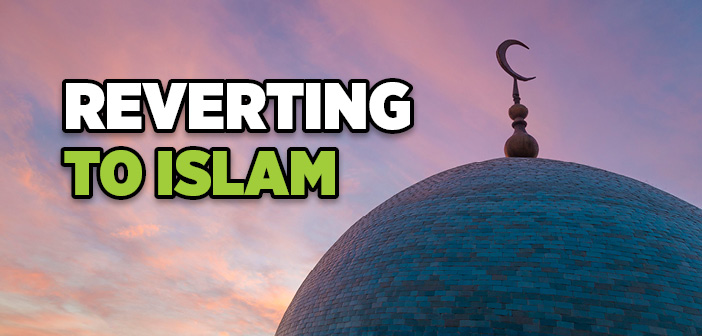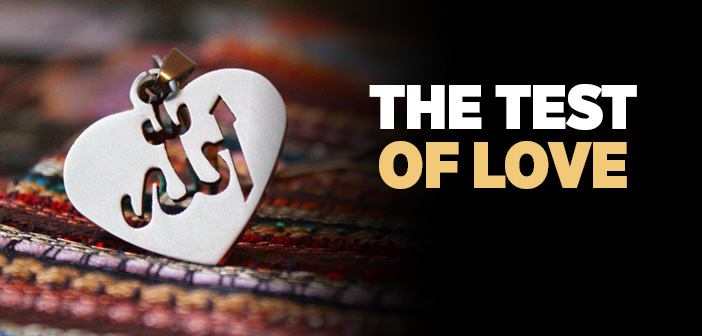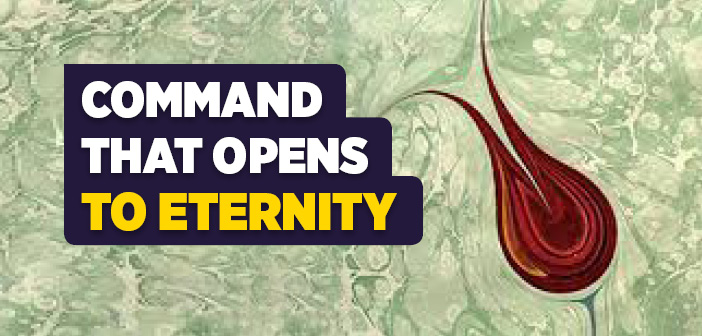What the is test of love in islam?
The duty of promoting the good is, at the same time, a test of our faith and love for the Almighty Allah, who praises true believers as having “…purchased paradise in exchange for their wealth and lives.” (See, Al-Tawbah, 9:111)
Working towards promoting the good is therefore an expression of the strength of our faith.
The noble companions channelled their strength to take the flag of truth over from the Prophet (SAW) and carry it across the horizon. They set out on campaigns of guidance all the way to China, Samarkand, Kairouan and deep into Africa. Caring little for danger, they bravely read aloud the Prophet’s (SAW) letters of invitation in the courts of tyrant kings and hangmen. No hardship or barrier they faced held them back from communicating the truth.
The companions also ended up settling in the lands conquered.
Out of the 120,000 companions who attended the Farewell Pilgrimage, only 20,000 remained in their lands of origin. Around 100,000 companions are now buried in lands their love for the truth and guidance took them.
Like the Prophet (SAW) had striven to guide them, these companions mobilised all their means to teach and guide the people in the lands where they relocated. They became conquerors of hearts and architects of souls. Their students were called the tabiun.
Likewise, the tabiun trained a generation to come after them, now known as tabi al-tabiun.
It was through these altruistic efforts that the Islamic world reached the vast borders it enjoys today, from India to Morocco and from inner Africa to Central Asia. History has been scene to many major and sweeping invasions, which have nonetheless quickly lost their influence. The Islamic conquest, on the other hand, has been permanent and continuous. This is only because it was not a conquest of lands or fortresses. It was a conquest of hearts.
They felt an enormous excitement and responsibility to guide mankind.
A wonderful example is provided by a member of the tabi al-tabiun generation, Abdullah ibn Mubarak (QS):
He had once gone on a journey alongside a man with bad habits. Once their journey ended and they went their separate ways, Abdullah ibn Mubarak (QS) began to cry inconsolably. His astounded friends asked:
“Why are you crying? What is it that makes you so sad?”
The saint heaved a deep sigh; and with teary eyes, he said:
“Despite our time together, I was not able to correct my friend’s bad habits. I could not improve that poor soul’s morals. I now think to myself, was it because of my faults that I could not offer him even the slightest benefit? If it so happens that my faults are to blame for my friend not coming around to the path of truth, then what will become of me in the hereafter?” as he continued to sob.
Fudayl ibn Iyad (QS) says:
“I realise I have neglected my duty of obeying Allah (JJ) when I see a change in attitude in my servant or donkey (and they start disobeying me).”
This is how sensitive they were. How about us?
It is a distinguishing feature of saints to share the pain of believers and worry about the possibility of meeting a terrible fate in the hereafter.
In fact, upon finding out that the greatest spiritual rank of his time had been given to a blacksmith named Abu Hafs, Bayazid Bistami wished to meet the man in person and learn about the traits that had elevated him to such a rank.
On finally meeting him;
Bayazid Bistami found out that Abu Hafs was a compassionate Muslim with a tender heart and eyes tearing at the thought of ‘What will become of Muhammad’s (SAW) nation?’. He saw that Abu Hafs was a man of mercy who sought to acquire a share of the Prophet’s (SAW) morals and, just like him, thought about nothing but his ummah.
The same feeling of responsibility and trepidation was also visible in Umar ibn Abdulaziz (QS). His wife Fatimah explains how he felt the pain of the Prophet’s (SAW) nation to his bones:
“One day, I went next to Umar. He was seated on his prayer mat with his hand on his forehead, crying so much that his cheeks had become wet.
‘What is wrong?’ I asked him. He replied:
‘Fatimah, I carry the heavy load of this ummah on my shoulders. I am distressed by the thought of the hungry, poor and the ill without the means to find medication, deserted widowers, victims who cannot make their voices heard, Muslims imprisoned in foreign lands, the frail and old who no longer have the energy to make a living and the poor fathers who cannot feed their big families. The more I think about my fellow Muslims near and far, the more I am crushed under the weight of my burden. How will I be able to answer if tomorrow, on the day of judgment, my Lord calls me to account and the Messenger (SAW) admonishes me and voices his complaint?’” (Ibn Kathir, al-Bidayah, IX, 208)
His wife Fatimah goes on to say:
“He worshipped only as much as you did. Yet, when in bed at night, he would be so immersed in reflecting on the Almighty and judgment day that his heart would palpitate from fear. He would flutter like a bird that has fallen into water or caught inside a palm. As for me, I could no longer endure his condition and put a blanket on him, thinking:
‘How I wish the duty of leading Muslims had not been entrusted upon our shoulders! How I wish that the distance between us and the duty was as great as the distance between the sun and the earth.’”
This worry and responsibility always made them sociable and drove them to sacrifice for their Muslim brothers.
Today, Muslim regions like Syria, Yemen, Egypt and Gaza have become lands of sorrow trembling under the tyranny of oppressors.
In light of how the companions and saints felt the troubles of their fellow Muslims as their own and shared the pain of victims deep in their hearts, is this not a time for self-criticism?
How emotionally moved are we by the plight of these miserable lands?
Does it make our hearts ache and convulse?
This criticism is also a measure of our compassion; a test of our mercy.
Lands uncultivated by the seeds of brotherhood, love, mercy and compassion are destined to become the future lands of mourning.
Is our compassion deep enough to extend like a bundle of mercy to the people deprived in lands of mourning? Does it transform into flowers of affection or fruits of mercy for the needy? Do the selfless offerings that spill over from our consciences give them a little bit of respite?
How would our hearts have felt if it were our own children, siblings or relatives suffering under tyranny? How would we have felt if we could not receive any news from them? Would we have not done everything in our power to save them?
Should not the brotherhood of faith spur us into similar emotions and effort?
While this is the bare minimum we can do, how much do our oppressed brothers and sisters feature in our prayers? Are we even praying to the Lord for them?
Many countries trembling today under tyranny and oppression were once Ottoman soil. They were our homelands, part of our own country. This fact burdens us with yet another responsibility.
Source: BEING A GUIDING LIGHT, Osman Nuri Topbas, Erkam Publications
 Source: BEING A GUIDING LIGHT, Osman Nuri Topbas, Erkam Publications
Source: BEING A GUIDING LIGHT, Osman Nuri Topbas, Erkam Publications




